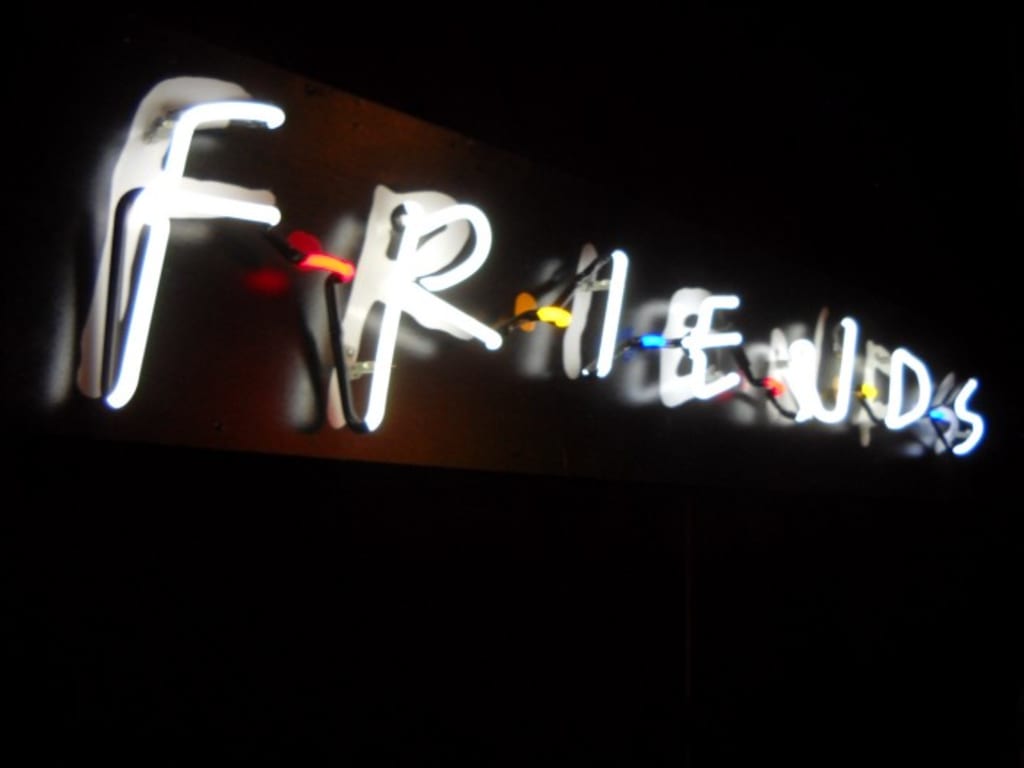‘Friends’ Hasn't Aged Well
Being funny is no excuse

‘Friends’ is arguably one of the most important milestone programmes in sit-com history. In fact, it could be argued that it is one of the biggest TV shows of all time, period. The tale of 6 friends, a deceptively simple premise, took the world by storm during its original run and even now, almost two decades after its final episode aired, it remains a firm fan favourite, with new generations discovering the show all over again. If nothing else, it’s sheer staying power is what has truly secured its place in the history books.
The sit-com is currently hosted on Netflix, available for all with a subscription (of which there are many) to watch. So I did. Back in the days where Comedy Central mostly consisted of ‘Friends’ re-runs, I saw a fair amount of the show, albeit in a slightly disjointed way. This time, I watched it obsessively and in order. I binged it.
Before I go any further, I would like to note that I do generally like ‘Freinds’ and I know it is an important and beloved show for millions. However, with that being said, I noticed upon my viewing in this modern age of 2021 that it, unfortunately, is not without sin. In fact, there are some serious problems in there that we need to address.
Gender and Sexuality in ‘Freinds’
Entertaining through every episode of the hit show invariably is, a few of them have not aged as well as one might hope. The overarching themes are fairly tame and generally well observed, but occasional jokes and minor sub-plots do miss the mark here and there.
In particular, I find the show's relationship with queerness very confusing. On the one hand, homosexuality is regularly mentioned in terms that might well have been progressive at the time, with Ross’s first wife actually being a lesbian, but then being ‘gay’ is also consistently used as a punchline against the male characters of the show.
The three leading men, in particular, regularly get put down for being feminine or gay as if it’s a bad thing. In season 5, episode 13, Joey gets himself a shoulder bag, or ‘manbag’, on Rachel’s advice. This prompts almost a whole episode of jokes about his gender. In season 3, Episode 18, Chandler uses a hypnosis tape to try and give up smoking, but the tape is aimed at women, using feminine pronouns. For the rest of the episode, Chandler engages in more and more stereotypically feminine behaviour, which is framed as a bad thing and played for laughs. A similar plotline is reused in a later episode, only that it’s Joey becoming more feminine because he’s living with a new female roommate.
As for references to sexuality, there is a spectacular double standard here. Whenever a male character does anything that even suggests attraction or admiration of another man, jokes are made about them being gay. These jokes fundamentally play off the idea that gayness is funny, despite the vague attempts of the show at being inclusive. On the other hand, similar references between women are not nearly as heavily mocked and are occasionally drooled over by any male characters present, which in some instances becomes rather disturbing.
The frequency of these mishaps needs to be addressed too. Jokes at the expense of women or queer people are everywhere in the show. Once I noticed the theme, I was barely able to get through a single episode without someone being called gay because they did something sensitive, or feminine, or creative. Chandler is targeted especially often in this way, most likely because he is the most generally sensitive of the three main male characters. So pervasive is this kind of humour in the show that questions around Chandler’s sexuality become a running joke before long.
Then we come to the abysmal way in which the character of Chandler's father is handled. In an effort to seem ‘right on’ but completely missing the mark, Charles Bing is introduced as a half-formed character who rarely appears but whose gender and sexual identities regularly get played for laughs. The character is sometimes referred to as a gay man and occasionally as a drag queen, despite being played by a female actor. The fact that the character is never seen as anything other than a woman, regardless of setting, would indicate the possibility that they are transgender, though this is in no way addressed. Male pronouns are used throughout for the character. The ridiculous thing is that the writers must have known that the pronouns didn't sit right with the character because, at different times, the use of both male and female pronouns for Charles Bing is played for laughs. The entire character, in all of their queerness, is just treated as one big joke.
The upsetting thing is that, even as I write this article, having just wrapped up my rewatching, more and more problematic instances occur to me. Entire episodes exist where the main contention is that Joey needs to kiss a guy for an audition, or another where Ross and Joey take naps together, both situations that introduce tension and laughs where there shouldn't really be any.
The episode which most upset me, however, was Episode 6, season 9 — ‘The One with the Male Nanny’.
This entire episode is a problem. Every aspect of the main plot is cringeworthy and deeply unwelcome. The basic premise is that Ross and Rachel are looking for a nanny for their daughter. After a series of less than ideal female candidates, a male applicant shows up and proves perfect for the role. From the moment the door opens on the male nanny character, the problems ensue.
Ross proves himself to be a genuinely unpleasant person in this episode, taking a disliking to the nanny because of his gender right from the very beginning. Open comments about the character's sexuality and manhood are made and continue to be made for the entire episode. His sensitivity is played as being a negative thing, his openness as an afront to masculinity. Every aspect of this character’s identity, who is a straight man, by the way, is directed and played for laughs.
While the women swoon over him, the men, Ross in particular, become almost aggressively hostile towards him. Scenes where the Nanny is playing with the baby using puppets, a reasonable thing for a nanny to do, are somehow spun into negatives in the eyes of the male characters and played as amusing moments for the audience. The entire episode is a masterclass in toxic masculinity, right up to the point where Ross actually fires the nanny because having a man in the role ‘makes him uncomfortable’.
And do you know what's worse? That was the 200th episode.
That's how they chose to celebrate.
Holding the past to account
Having established that ‘Freinds’ is consistently problematic, the question remains as to what we should do with that information.
The truth is, there's not much we can do. The show has been over for decades and the creators and stars have made their millions. There's little chance of erasing the impact of it on culture either, what with it being one of the most popular TV programmes of all time.
We could campaign for it to be taken down and hidden away, no longer accessible to the generations for whom standards of social progressiveness are so much higher. That would work and it has been done before.
But can we hold the art of the past to the standards we have today? The world was a very different place 20 years ago, and so the gags were all different back then too. Tens of millions of people watched these episodes as they aired and generally seemed to enjoy them.
Does this make the bigotry ok? Hell no. Of course, it doesn't. These jokes and themes are simply not in keeping the morals we hold, or should hold, today. But then neither are many of the topics in many other tv shows and films. The worst offenders are hidden away and taken out of circulation, as they should be, but for the most part we let people decide what they do and do not what to watch, even if it does contain outdated jokes and plots.
Is that the right way to go? Letting each person decide for themselves?
Maybe. I honestly don't know for sure.
I think it's important that we don't censor all art from the past that offends us, mainly because there wouldn't be much left. Artists like Picasso were often misogynists, plenty of old films were racist, and early references to homosexuality were less than flattering. None the less, some of these paintings, films, and book are milestones in our creative and cultural histories, and we should be careful about trying to wipe them away completely.
I still enjoy ‘Friends’. I genuinely do, even with the jokes that make me cringe and the plots that upset me here and there. It was good TV then and, to be honest, its good TV now.
Do I think it's problematic? Yes, absolutely.
But do I think we should lock it away, never to be seen again? No, I don't think I do.
Having said that, we should try to get into the habit of making sure to frame art and creative endeavours in the standards of their own eras. Trigger warnings at the start of films and TV shows would help with this, stating that there are difficult themes ahead and informing audiences of the date of the original release. That way, people can make up their own minds about what they do and do not wish to consume. That way, people are prepared for it when the standards by which we try to live now are blatantly and openly broken, an experience that can be jarring and upsetting.
‘Friends’ is pretty homophobic and generally bigoted towards the queer community. That is a simple and irrefutable fact. But it’s also one of the most important events in TV history. It matters, warts and all.
So, should you watch ‘Friends’?
Yeah, I think you should if you want to. Just be aware of what you are getting yourself in for. The show has its problems and it's important that we recognise them if we are going to keep watching. We have to start providing people with more information and context about their content before they actually consume it. Then people can make up their own minds based on all the necessary information. We already put age ratings on films, so this shouldn't be a massive leap.
Let's give people choice, but lets not let content off the hook just because it’s from a different time. ‘Friends’ is funny, sure, but it's also problematic. I think people should be aware of both of those things before they sit down to watch it.
About the Creator
Sean Bennett
Writer, producer, editor and all-round curious so and so. Writing about politics, being queer, and anything else that springs to mind! (He/Him) Get in touch at - [email protected]






Comments
There are no comments for this story
Be the first to respond and start the conversation.